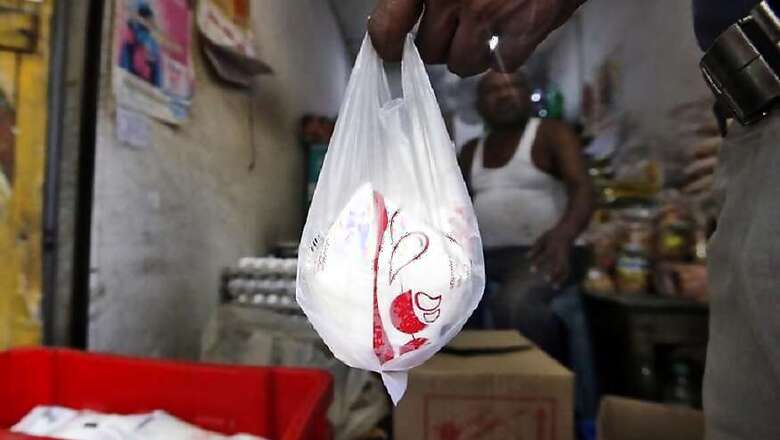
views
Guwahati:The dairy industry in Assam has come to a standstill with dairy farmers having to deal with lockdown regulations that have severely impacted their livelihood. Worried that the cattle may fall sick due to feed shortage, rise in fodder prices and unavailability of forage during the coronavirus lockdown, the traditional dairy farmers in Jorabat area of Kamrup district are waiting for the state government to ease restrictions and help them out in this crisis.
On Sunday, five dairy farmers from Ghanshyam Patti village in Nepali Basti hired a van to travel almost 20 km to Guwahati to sell the milk. At least 250 people live in the basti that has 50 dairy farmers in a cluster.
Though dairy and milk goods, shops selling animal fodder fall under essential services according to Home Ministry guidelines, the lockdown has hit their daily routine and transportation of milk to the wholesale markets.
“All hotels and restaurants are closed, so the wholesalers do not buy milk from us. I bought 120 litres of milk, and managed to sell only 20 litres,” said 42-year-old Shivlal Sharma, a dairy farmer who takes care of 80 jersey cows in his household.
Shivlal and other dairy farmers of Jorabat have requested the government to ensure availability and supply of cattle feed during the lockdown period.
The farmers are throwing away thousands of litres of milk each day.
“We can still throw the milk, but we need to keep the cattle alive. In some of the farms, the cattle are in a critical condition, not able to get up. How will we feed the cows? The fodder was priced at Rs 1000 before the lockdown and now it has gone up to Rs 1300,” said Pradip Ghosh, another dairy farmer.
“Usually, we milk cows at six in the morning, feed them, clean the barn – but now, we are turning the milk into cream. Till 12 noon, we separate the cream from raw milk. But where will we store it? I have discarded almost 50-60 litres of milk today and the cream will also be wasted,” remarked Ramu Sharma, a 60-year-old dairy farmer, who has never seen such times before.
“The commercial dairy farmers have a proper system - they can preserve the milk in big refrigerators for at least two days,” he added.
On the other hand, the Sitajakhala Dugdha Utpadak Samabai Samiti Ltd (SJDUSS) in Morigaon district has sought government help to set up a joint venture for producing approximately 15-20 thousand litres of milk and dairy products daily.
In the first two days of lockdown, the dairy farmers of Sitajakhala threw away almost 10,000 litres of milk in the Killing River. At present, the farmers are facing a loss of Rs 12-13 lakh of daily turnover for not being able to supply milk.
During the Chinese aggression in 1962, these farmers did yeoman’s work in supplying milk to the army personnel in the frontline and they believe they can do more.
“We could supply milk during a war, but this seems worse now. We have our own processing plant, pasteurisation and other units to produce about 20,000 litres of milk and milk products daily. To cope with the circumstances, people need to boost their immunity and develop strength for which milk is absolutely essential,” said Ranjiv Sharma, Chairman of Sitajakhala Cooperative Society, which was launched in 1958 with only 17 members, and now has about 1500 members.
The dairy farmers of Sitajakhala launched their first full-fledged milk processing unit in November 2018 at Jagiroad on the outskirts of Guwahati.
“The commercial dairy farmers have been affected to a great extent. They are suffering today because their land-holding capacity is very small. Dairy farming is their primary source of income – almost 80% are dependent on cattle feed from other states, mostly West Bengal, Bihar and Uttar Pradesh. Fortunately, we had been trying to preserve silage fodder since the past 3 years and we have some of it in stock,” Sharma added.
In Assam, there is a gap between the dairy market and farming, transport and storage of milk. According to reports, almost 95% of the dairy industry in Assam remains unorganised and milk marketing is controlled by traditional channels.
“We are producing 17-18 thousand litres of milk a day, but where do we take it? We have no other option but to throw it away. About 1,100 farmers are directly catering to 25,000 consumers in Guwahati and adjoining places. The lockdown has severely affected 8-9 districts. The National Dairy Development Board is here since 2008, and yet our farmers find themselves helpless today,” he said.
The commercial dairy farmers of Assam now look forward to the state government to cater to their needs – building an effective milk marketing chain that would give farmers a fair return on their investment and assist farmers by paying at least Rs 5 per litre that would bring a sense of relief in the 21-day shutdown period.
As the situation turns serious, the farmers are holding meetings in their areas to discuss solutions to their problems.

















Comments
0 comment